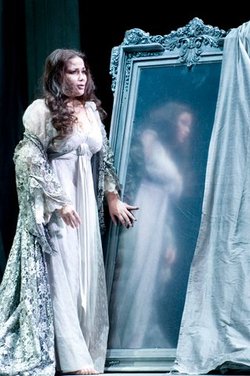 Speight Jenkins steps out from the wings just before La Traviata's opening curtain to announce that the star of the show, soprano Eglise Gutiérrez, is suffering from a cold...but will perform regardless. Knowing murmurs (and not a few coughs) rustle through the audience: in the opera, the soprano's character has consumption and expires. Was this a pre-excuse for a sub-par performance?
Speight Jenkins steps out from the wings just before La Traviata's opening curtain to announce that the star of the show, soprano Eglise Gutiérrez, is suffering from a cold...but will perform regardless. Knowing murmurs (and not a few coughs) rustle through the audience: in the opera, the soprano's character has consumption and expires. Was this a pre-excuse for a sub-par performance?
(In the Seattle opera photo by Rosarii Lynch, a sickly Violetta confronts the mirror shortly before she succumbs.)
Early on, it didn't go all that well. Gutiérrez sounded quite tentative in her first duet with tenor Francesco Demuro (whose North American debut at Seattle Opera was being touted as the second coming of Pavarotti) and he, too, seemed to be holding back. But once Gutiérrez warmed up, she was unstoppable. Her coloratura E-flat at the end of Act I was downright explosive, sending shockwaves through McCaw Hall.
The note isn't in the score, and Verdi discouraged his singers from adding it. The gold cast Violetta, Nuccia Focile, a more experienced singer and better actress than Gutiérrez, doesn't stretch for it ("it's out of character.," she says). But there's no denying the power of that note, delivered at the end of what could well be Verdi's longest dramatic aria. For his sickly playgirl heroine, he wrote a 20-minute solo that begins with her doubts and confusion over Alfredo, the admirer she just met ("Fors'e lui?"), then her resolve to keep on partying ("Sempre libera"), only to be turned on again by the torment and delight of true love ("croce e delizia al cor"). Verdi is at the peak of his genius here, even without the E-flat.
For his part, Demuro's an earnest performer, by turns subtle and expansive, an ideal tenor, from a director's point of view, in an opera world full of self-absorbed divas and one-note wonders. In his duets with Gutiérrez, he seemed to defer to her (knowing that her health was frail); no such restraint in his Act II solo celebration of domesticity with Violetta. Ever the courtly southerner, Dallas-born Speight Jenkins respects a lady who doesn't over-promise and admires a gentleman who minds his manners onstage. The rest of the opera goes down like a throat lozenge; it really is a case, as Violetta sings, that "Pleasure is the best medicine."
Gutiérrez sings again Sunday afternoon at 2:30. Tickets: SeattleOpera.org
PS: La Traviata is the sort of story (courtesan with heart of gold but deadly disease) that lends itself to range of stagings. Check out this one set at the train station in Zurich, Switzerland, where the cast mingles with commuters on cellphones.
Leave a comment